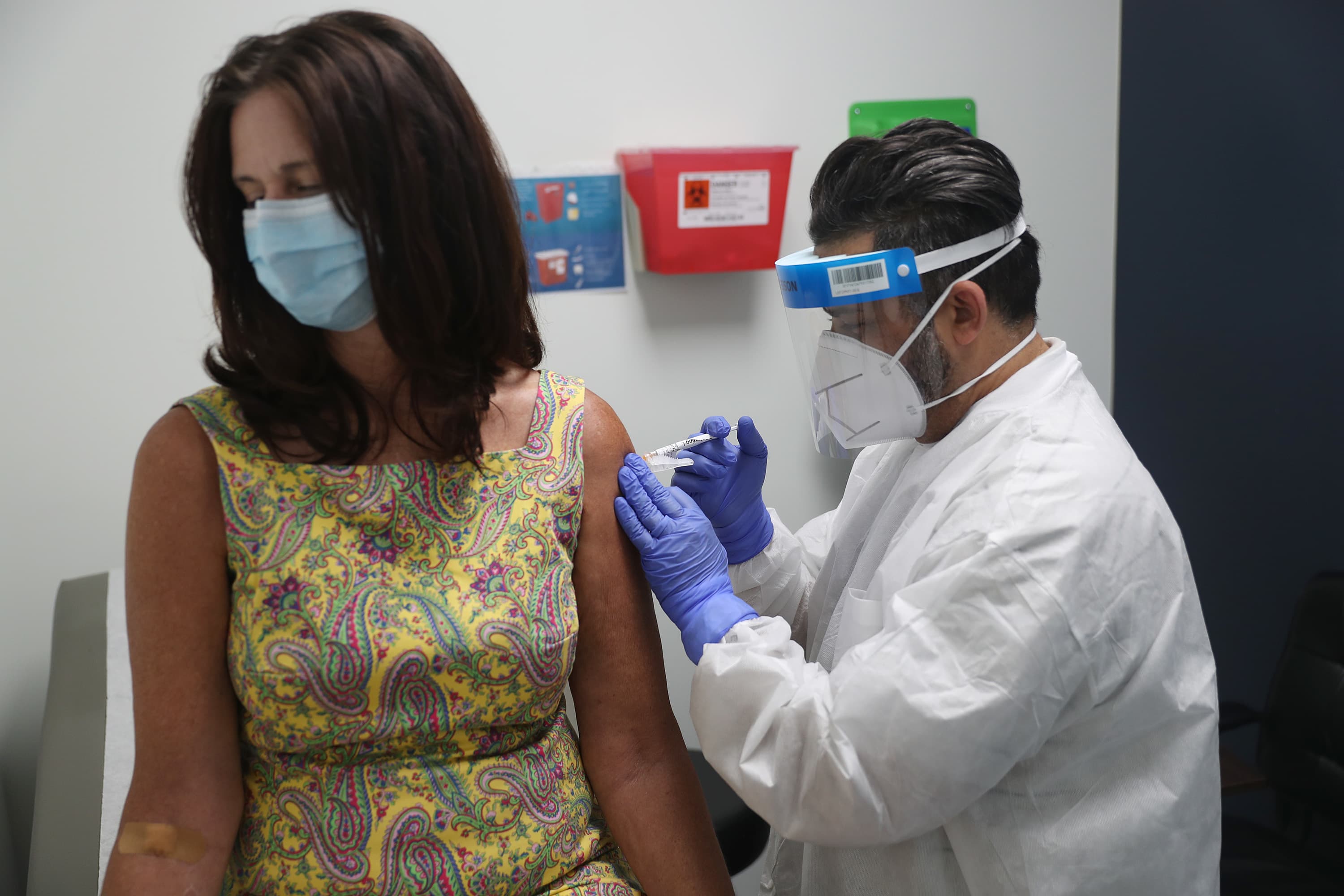
Lisa Taylor receives a COVID-19 vaccination from RN Jose Muniz as she takes part in a vaccine study at Research Centers of America on August 07, 2020 in Hollywood, Florida.
Joe Raedle | Getty Images
A group of drugmakers competing to bring a coronavirus vaccine to market plan to issue a public statement as soon as next week that says they will not seek government approval until enough data has been collected to ensure the drugs are safe and effective, CNBC confirmed Saturday.
An early draft of the joint statement promises to prioritize the safety of vaccinated people, according to The Wall Street Journal, which first reported the plans to issue a statement. Pfizer, Johnson & Johnson and Moderna are expected to participate in the pledge, the Journal reported. CNBC has confirmed that Sanofi also plans to participate.
The pledge comes as scientists and public health specialists express concern that the Trump administration is exerting pressure on regulators, especially the Food and Drug Administration, to authorize a vaccine before the Nov. 3 presidential election.
“We believe this pledge will help ensure public confidence in the Covid-19 vaccines that may ultimately be approved and adherence to the rigorous scientific and regulatory process by which they are evaluated,” a draft of the statement says, according to the Journal.
The Journal added that the statement says the companies would only seek an emergency use authorization or government licensure based on “substantial evidence of safety and efficacy” from phase three clinical trials. However, top U.S. health officials, including FDA Commissioner Dr. Stephen Hahn and Director of the National Institute of Allergy and Infectious Diseases Dr. Anthony Fauci, have recently said a phase three trial could be ended early if a vaccine yields strong evidence quickly.
An emergency authorization by the FDA would come as public health specialists express concern that the agency has previously yielded to political pressure. The agency issued an emergency authorization in March for the use of Trump-backed anti-malarial drugs chloroquine and hydroxychloroquine in treating Covid-19 patients. But the agency revoked the authorization in June based on emerging evidence that the drugs could cause cardiac complications and increase the risk of death in some Covid-19 patients.
And last month, Hahn walked back comments he made on the benefits of convalescent plasma at a White House press conference in which the emergency authorization of the Covid-19 treatment was announced. Scientists criticized Hahn for overselling the benefits of the treatment, which data suggests are more modest, in remarks that were repeated by administration officials, including President Donald Trump.
“Political considerations should be put aside by Republicans and Democrats,” the vaccine manufacturers’ draft statement says, according to the Journal.
Regulators and drug companies have been moving at a record pace to bring a vaccine to market that effectively and safely combats the coronavirus, which has infected more than 26.6 million people and killed at least 875,400 people around the world. The stakes are high, as forecasters and epidemiologists warn that the winter could prove to be even more deadly.
The U.S. has invested more than $ 10 billion in six different vaccine efforts through Operation Warp Speed, the Trump administration’s effort to rapidly bring Covid-19 vaccines and treatments to market. Three companies, Moderna, Pfizer and AstraZeneca, are already testing their vaccine candidates in phase three trials.
It’s unclear if AstraZeneca plans to participate in the joint pledge, but the company previously released a statement committing to “follow the science” and “put patients first.”
Democratic vice presidential candidate Kamala Harris suggested in an excerpt of an interview with CNN broadcast on Saturday that President Donald Trump might use a vaccine to bolster his appeal heading into the election.
“He’s looking at an election coming up in less than 60 days and he’s grasping for whatever he can get to pretend he can be a leader on this issue when he’s not,” she told CNN.
She added that she “would not trust Donald Trump” and that she would only be convinced by an outside evaluation of public data on a vaccine’s safety and efficacy.
Judd Deere, spokesman for the White House, said in a statement to CNBC that every decision the FDA has made has maintained the agency’s “gold standard for safety and been data-driven.” He added that it’s a “false narrative… that politics is influencing approvals.”
“President Trump believes all Americans should have access to proven, safe, and affordable treatment options and the rapid research, development, trials, and scientific approvals are emblematic of President Trump’s highest priority: the health and safety of the American people,” he said.
Concerns that the political calendar could affect regulatory scrutiny of potential vaccines in the U.S. were heightened after the Centers for Disease Control and Prevention sent a letter to state health officials directing them to expedite the approval process for medical supply company McKesson so it can set up coronavirus vaccination sites by Nov. 1. Health and Human Services Secretary Alex Azar quickly defended the move, saying it had nothing to do with the Nov. 3 presidential election.
Dr. Moncef Slaoui, who is leading Operation War Speed, said last week that the CDC directive was for planning purposes and a vaccine is
“extremely unlikely” to be ready for public distribution by November.
“There is a very, very low chance that the trials that are running as we speak” could be ready before the end of October, Slaoui told NPR. “And therefore, there could be — if all other conditions required for an Emergency Use Authorization are met — an approval. I think it’s extremely unlikely but not impossible.”
He said he “firmly” believes a vaccine will be available before the end of the year and “in quantities that can immunize patients at the highest risk, which means very old people, 70 years and older, and maybe people that are highly exposed on the first line.”
— CNBC’s Berkeley Lovelace contributed to this report.
